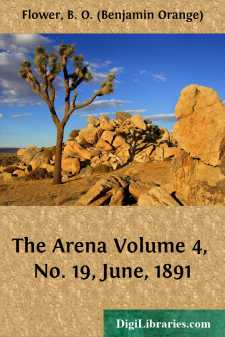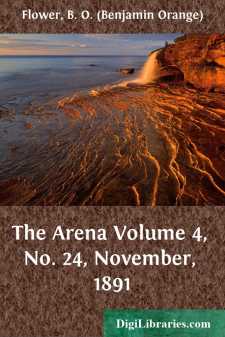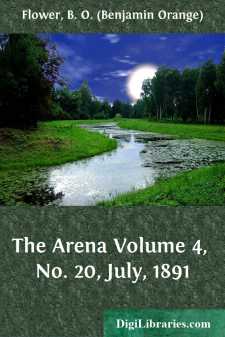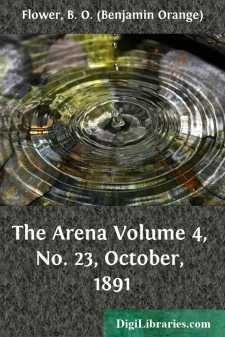Categories
- Antiques & Collectibles 13
- Architecture 36
- Art 48
- Bibles 22
- Biography & Autobiography 813
- Body, Mind & Spirit 142
- Business & Economics 28
- Children's Books 14
- Children's Fiction 11
- Computers 4
- Cooking 94
- Crafts & Hobbies 4
- Drama 346
- Education 46
- Family & Relationships 57
- Fiction 11829
- Games 19
- Gardening 17
- Health & Fitness 34
- History 1377
- House & Home 1
- Humor 147
- Juvenile Fiction 1873
- Juvenile Nonfiction 202
- Language Arts & Disciplines 88
- Law 16
- Literary Collections 686
- Literary Criticism 179
- Mathematics 13
- Medical 41
- Music 40
- Nature 179
- Non-Classifiable 1768
- Performing Arts 7
- Periodicals 1453
- Philosophy 64
- Photography 2
- Poetry 896
- Political Science 203
- Psychology 42
- Reference 154
- Religion 513
- Science 126
- Self-Help 84
- Social Science 81
- Sports & Recreation 34
- Study Aids 3
- Technology & Engineering 59
- Transportation 23
- Travel 463
- True Crime 29
The Arena Volume 4, No. 22, September, 1891
Categories:
Description:
Excerpt
It is a good thing that the Inquisition, Star-chamber, and other compulsory institutions of the dark past have departed from Europe, and have never been tolerated in America. Were it not so, at the present time there would be much excellent work for the rack, the thumbscrew, and the faggot. Heresy is in the air, especially in the northern latitudes of the United States. We inhale it with the morning breezes, it stimulates us to mental activity during the noon hour, and at times stifles us as by the sultry atmosphere of a blistering day. Everywhere it is being discussed, and by every kind of individual, qualified or unqualified for such high contentions. Daily journals, hitherto never remarkable for orthodoxy, have suddenly grown anxious as to the future of the faith; and other journals, that have always antagonized orthodoxy, are, figuratively speaking, rubbing their hands most gleefully and smiling through their editorial columns with a most perceptible "I told you so"; while religious papers, representing as they do, the conservative element in this country, are apparently staggered at the inroads which the so-called higher criticism has made of late. Aged people ominously shake their heads, and striplings of the limp-back Bible type are amazed at the stir which ideas are making in the community, and which threaten to disturb the peace and quiet of their mediocre godliness; and pious women engaged on crazy quilts, in the interest of noble benefactions, stop with punctured and bleeding fingers to protest against all departures from ancient doctrinal symbols.
Suspects are numerous, and, as in the days of the worthy Council of Ten in Venice, no prominent person, especially a teacher, is beyond surveillance. If he adventures just a little from the beaten path, even though it may be to gather a thought, which, like a wild field daisy, given by the bounty of the Infinite One for the delight of his creatures, he has found growing on the wind-swept plain of natural religion, honored possibly by heathen seers and philosophers, he is likely to be summoned before the black draped, gloomy councillors and familiars of modern inquisitorial conservatism.
In my opinion there is no real need for the morbid anxiety that now prevails in certain quarters, and surely no serious alarm should be felt for the perpetuity and stability of truth. Truth is truth, and all the bad captains that ever sailed that bark, and all the bad navigators that ever misdirected its course, have never been able to run it on the lee shore, or bring it to final shipwreck, and never can; for over and above all human devices and guidings there is a divine hand that upholds and shields that which, next to his Infinite Self, is the most precious blessing yet conferred upon the human mind.
Let us remember that the heresies of the hour are not of the "damnable sort" which, as Peter declared, deny the Lord who bought us; neither are they mixed with such immoralities as Paul condemns in his letter to the Galatians. And if we may believe that the words of that same apostle have any pertinency in our times, then, when he declares that heresies or schisms must arise among us "that they which are proved may be made manifest," we may confidently expect that out of the present discussions and the "jangling of sweet notes out of tune" some broader thought and some nobler conception of divine teachings, revealed to us in Holy Scripture, will assuredly come to the church and to the world.
I think that the leaders who are solicitous for the ark of God ought to try to characterize the opinions which have given rise, in these latter days, to threatened trials for heterodoxy. It is so easy to say that a man who differs from ourselves is not orthodox, and to avoid an actual and exact statement of what we mean; when in fact we deal unjustly with him, and produce a wrong impression on the community at large.
Let us notice the three distinctive and discriminating marks of so-called heresy in evangelical churches, and I think you will be persuaded that it is unwise for us to be alarmists, and imprudent "to breathe out threatenings and slaughters."
It will be observed that the newer heresies do not challenge the truth of Scripture inspiration, only the form and philosophy of such inspiration. The men who are suspected of entertaining erroneous opinions concerning the method of Divine impartation of truth are the strenuous advocates of the moral grandeur, spiritual authority, and faith-sufficiency of the heavenly oracles. They, it is true, deny what has been known as the verbal theory—a theory which owes more to the post-reformers' fear of an infallible pope, than to any real, intelligent cause—but by no recognized council or decree, acknowledged by Protestants, has that mechanical conception ever been made binding on the conscience....






